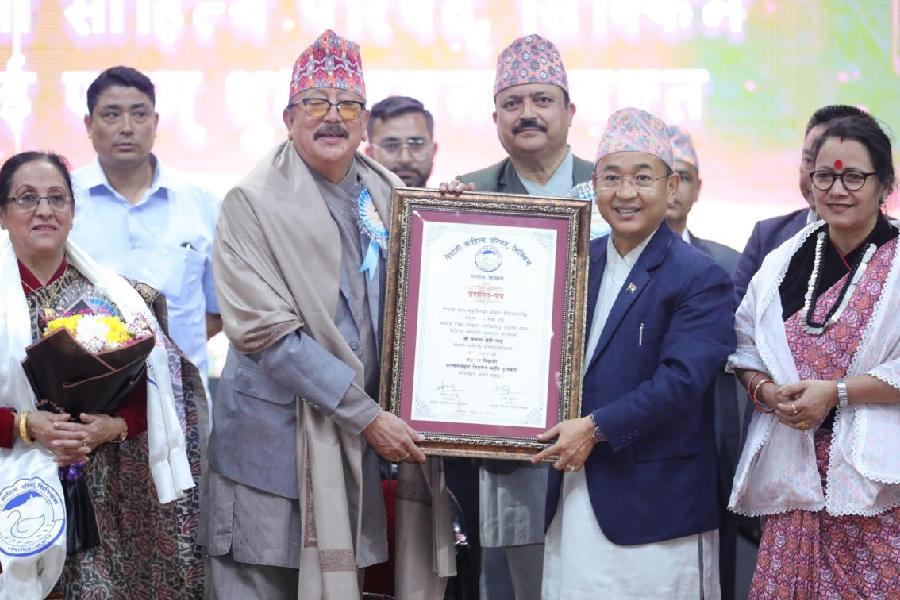The Sikkim government issued a notification on Wednesday stating that all official notifications and gazettes shall henceforth be published in Nepali, along with English.
Earlier, notifications and gazettes would be published only in English in the Himalayan state.
The notification issued by chief secretary V.B. Pathak comes a day after chief minister Prem Singh Tamang (Golay) promised to take measures to strengthen the use of the Nepali language.
Golay was addressing a Bhasha Diwas programme in Gangtok.
On August 20, 1992, the Nepali/Gorkha language was included in the Eighth Schedule of the Constitution and since then, the day has been celebrated as Bhasha Diwas by the Nepali-speaking Indian citizens.
“Now, therefore, as a step towards fulfilling this constitutional mandate, the State Government has decided that henceforth, all official notifications and Gazettes shall be published in both English and Nepali languages,” read the notification issued by Pathak in English. The notification to the effect was issued in Nepali also.
On Tuesday, Golay had said: “Within a week, we will come out with an order stating that government notifications, henceforth, will also be issued in Nepali language. Government advertisements would also be published in Nepali.”
The chief minister directed the state education department to explore the possibility of distributing Nepali dictionaries to students in the state.
“If notes (on government files) are written in Nepali (by officials), we will have no problems as the language is constitutionally recognised,” said Golay.
A suggestion to issue government orders in Nepali had come from Dr Krishna Sapkota, a professor at the Kangchendzonga University, during the Bhasha Diwas celebration in Gangtok on Tuesday.
Even though Nepali was recognised in 1992, there was widespread discontent that the language was not being promoted.
Golay’s decision has been appreciated by various associations from Darjeeling to Sikkim.
On this side of the Teesta, Bimal Gurung, the then chief executive of the Gorkhaland Territorial Administration (GTA), had in 2014 announced that the hill body would correspond with the central and Bengal governments in Nepali.
“Despite the Nepali language being recognised, we have not implemented it properly and that is why we are still talking about the importance of the (language’s) status. We have started using Nepali language in the GTA on a small scale and we will have to move step by step,” Gurung had said while addressing a Bhasha Diwas programme at Gorkha Rangamanch Bhavan here.
However, the GTA has never corresponded with the governments in Nepali and its usage in the hill body also fizzled out.
“Golay seems to have worked smart by deciding to use both English and Nepali,” said a person who was involved in the GTA’s attempt to use Nepali in the hill body.
The demand to include the Nepali language in the Eighth Schedule of the Constitution gathered steam in 1956 but political parties failed to deliver much at the time.
On January 31, 1972, eminent people in the hills, fed up with the lack of progress on the issue, formed the Bhasha Samiti, which was later rechristened as the Akhil Bharatiya Bhasha Samiti.
The Samiti took up the task of uniting all political parties, holding mass meetings and spreading the demand for inclusion of Nepali in the Eighth Schedule to other states where Nepali-speaking people resided. The Samiti also met Prime Minister Indira Gandhi repeatedly to press for the demand.
“During our first meeting, she categorically told us it would not be possible to recognise the language and raised security concerns on agreeing to the demand,” Prem Kumar Allay, the late founder secretary of the Bhasha Samiti, had earlier said.
Such was the mass support for the demand that when Indira visited Darjeeling to address a public meeting on the St Joseph’s School ground in the mid-1970s and did not say anything about according the official tag to Nepali language, the crowd overran the podium and the then Prime Minister had to be rescued from the stage. In 1979, when then Prime Minister Morarji Desai visited the hills, the Bhasha Samiti called a bandh as he, too, had not given any assurance on the inclusion of Nepali in the Eighth Schedule of the Constitution.










